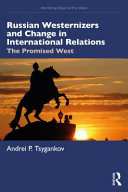

Most ebook files are in PDF format, so you can easily read them using various software such as Foxit Reader or directly on the Google Chrome browser.
Some ebook files are released by publishers in other formats such as .awz, .mobi, .epub, .fb2, etc. You may need to install specific software to read these formats on mobile/PC, such as Calibre.
Please read the tutorial at this link: https://ebookbell.com/faq
We offer FREE conversion to the popular formats you request; however, this may take some time. Therefore, right after payment, please email us, and we will try to provide the service as quickly as possible.
For some exceptional file formats or broken links (if any), please refrain from opening any disputes. Instead, email us first, and we will try to assist within a maximum of 6 hours.
EbookBell Team

5.0
108 reviewsThis book looks at Russian thinkers and politicians who have considered Western/European civilization to be superior to others and who have drawn the conclusion that Russia consequently ought to align itself with the West, rather than preserving certain traditional Russian values – and that not doing so is an impediment to political, social, and economic evolution. Within this trend of thought, the author identifies four schools – Christian Westernizers, Economic Liberals, Political Liberals, and Social State Supporters – and explores examples of each. The author compares Russian thinkers from different periods, finding contrasts and similarities within their political and historical settings and assessing their responses to their unique circumstances. He analyzes Russian Westernizers’ self‑definition and ideas of national freedom relative to those of Western nations, exploring how the West’s definition of values and institutions has changed over time. He shows how Western historical developments affected waves of Westernization and pro‑Western thinking inside Russia, arguing the importance of this being grounded in national state‑building priorities. The growing complexity of global relations, the declining global influence of the West, and the war in Ukraine present Russian Westernizers with new questions and challenges, and this book assesses the resulting implications.
This book will appeal to students and scholars of Russian foreign policy, Russia–West relations, IR theory, diplomatic studies, political science, and European history including the history of ideas.